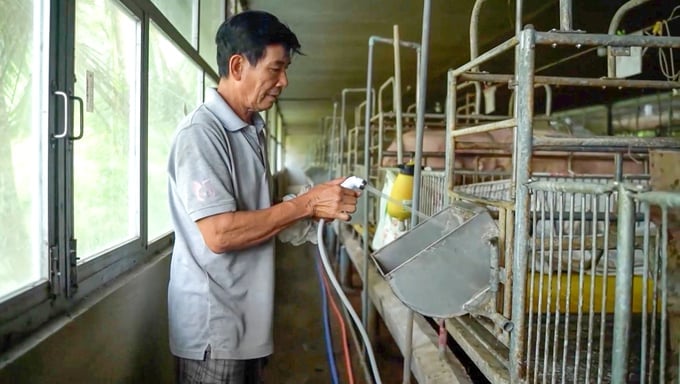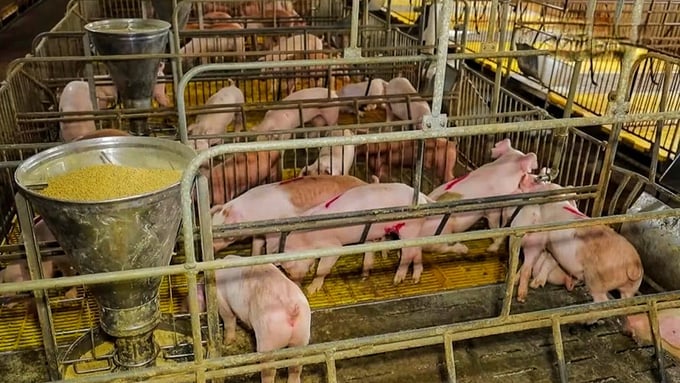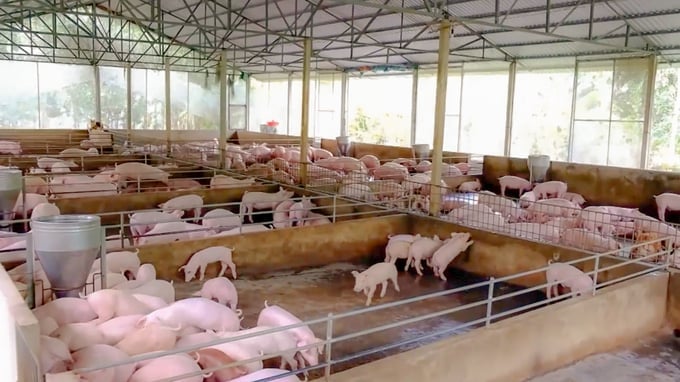November 27, 2025 | 19:13 GMT +7
November 27, 2025 | 19:13 GMT +7
Hotline: 0913.378.918
November 27, 2025 | 19:13 GMT +7
Hotline: 0913.378.918
The application of high-tech advancements in livestock farming is recognized as a pivotal strategy for an effective disease control. The initiative is actively pursued by the agricultural sector in Can Tho city as well as local large-scale livestock farms.

Can Tho city boasts a total of 289 livestock and poultry farms, primarily consisting of small and medium-scale operations, with a lack of large-scale industrial farming establishments. Photo: Kim Anh.
However, the development of high-tech livestock farming requires substantial efforts. Various factors including capital, land funds, and livestock farming policies stand as obstacles. Namely, establishing and developing high-tech medium-scale livestock farms costs four to five times higher compared to traditional farming models.
The Dung Nhung clean pig farm in Dinh Mon commune, Thoi Lai district, supplies an average of 700 to 800 breeding pigs and 300 to 500 commercial pigs to the market every year. The owner, Mr. Duong Hoang Dung, is eager to expand the scale of his farm and invest extensively in automated machinery and equipment to reduce labor costs significantly. Moreover, this development aims to prevent the risks associated with disease outbreaks and increased prices of raw materials such as feed or breeding animals.
According to Mr. Dung's calculations, one kilogram of pig costs approximately 55,000 VND to produce, whereas market fluctuations caused the selling price for live pigs to fall between 50,000 and 52,000 VND per kilogram. Coupled with the labor costs, livestock farmers are subject to heavy losses.
In order to encourage the application of advanced technologies in livestock farming, Mr. Dung expects that the agricultural sector will establish supportive policies for farmers. This solution can involve granting access to credit sources and providing land funds to expand high-tech livestock farming.
"Having the determination is only one step in the process. The government needs to provide encouragement to help livestock farmers maintain faith in sustainable livestock farming," Mr. Dung emphasized.

Establishing and developing high-tech medium-scale livestock farms costs four to five times higher compared to traditional farming models. Photo: Kim Anh.
According to Can Tho city's Department of Livestock Production and Animal Health, there are a total of 289 livestock farms in the city. However, only four of these farms operate on a large scale with a focus on pig and poultry farming. The remaining number operate on medium or small scales. Additionally, there is a notable absent of industrial-scale farms whereby technology is the primary driver of production.
Mr. Pham Truong Yen, Deputy Director of Can Tho city's Department of Agriculture and Rural Development, observed that climate change has led to extreme weather conditions, which resulted in disease outbreaks such as the African swine fever. Consequently, diseases have significantly affected the livestock industry nationwide with one of the most severely affected regions being Can Tho city.
Moreover, the supply chain of livestock materials and input has increased, affecting the efficiency of livestock farming as a whole. The city's agricultural sector recently implemented several programs and policies to support livestock farmers in implementing disease prevention measures and good agricultural practices. However, the level of high-tech application in the city's livestock farming sector failed to meet its potential due to the prevalence of small-scale livestock farming households.
The shift towards large-scale and high-tech livestock farming requires capital and land resources, which are located in areas reserved for livestock farming according to the city's planning. According to Mr. Yen, the current high interest rates for loans and the timing of technological investments have failed to yield profits so far. As a result, farmers are hesitant to follow example.

Livestock farmers hope for supportive policies which will enable access to credit resources and high-tech applications. Photo: Kim Anh.
Furthermore, according to Mr. Yen, stable planning is essential for developing high-tech livestock farming. Additionally, economic and financial mechanisms must be established to attract investment. Addressing infrastructure issues such as electricity and roads is also crucial to incentivize farmers to invest.
By implementing the agricultural restructuring plan, Can Tho city is aiming to shift livestock farming from decentralization towards defining concentrated livestock farming areas, with an emphasis on large-scale operations which apply high technology and preserve the ecological environment.
The livestock development plan in Can Tho city from 2021 to 2025 aims to guide and support the construction of disease-safe livestock models for both poultry and cattle.
Furthermore, the city will also focus on developing safe food production models by implementing good livestock farming practices and ensuring biological safety to prevent animal diseases locally. Strengthening support and connections in the production chain to improve product consumption is another priority.
Most importantly, Can Tho city will organize livestock farming along the value chain to ensure an enclosed system featuring connections with leading businesses. This aims to harmonize the benefits among farmers, processors, and consumers, thereby minimizing intermediary stages.
Translated by Nguyen Hai Long

(VAN) According to Mr. Vo Minh Thanh, Director of the Tay Ninh Department of Agriculture and Environment, Resolution 57 has created a new development pathway for the locality, shifting from traditional toward modern agriculture.
/2025/11/26/4909-2-154329_878.jpg)
(VAN) Pearl grouper farming in HDPE cages not only delivers economic efficiency but also contributes to protecting the environment, creating jobs, and promoting marine-based experiential tourism.

(VAN) The model of making a living under the forest canopy through the agroforestry system in Van Son commune, Bac Ninh province, is expected to generate an annual income of approximately VND 30 million/ha.

(VAN) Many enterprises in Can Tho are harnessing natural energy and reducing greenhouse gas emissions in their production processes, thereby contributing to the promotion of a sustainable green transition.
/2025/11/24/3536-2-112800_176.jpg)
(VAN) Dong Nai now has tens of thousands of hectares of forests certified for sustainable management, and this area will continue to be expanded in the coming period.

(VAN) Vinh Ha hamlet (Dai Xuyen commune, Hanoi) is shifting away from small-scale farming as households adopt bioscurity into their breeder chicken models.

(VAN) Heavy rains make aquatic species more vulnerable to disease. Proactive water management and high-tech systems help farmers prevent outbreaks and protect yields.